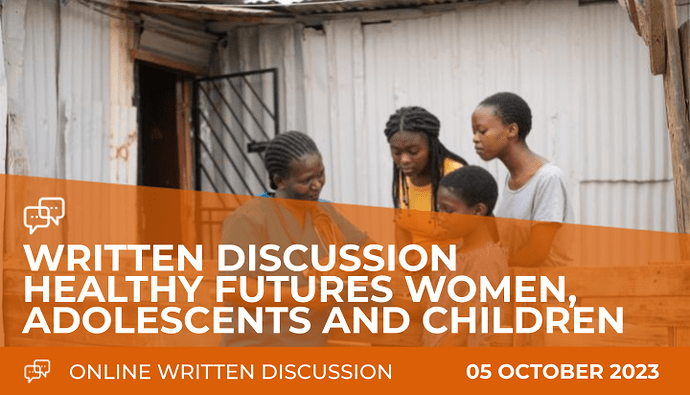Join us for this live written discussion with a panel of experts to explore the role of business in improving maternal, child and adolescent health.
LIVE Panel
Thursday 5 October, 10am to 11pm EDT / 3pm to 4 pm BST
Background
Efforts to secure a healthier future for the world’s most vulnerable women, children and adolescents are falling behind: over 60 countries are off-track to meet the Sustainable Development Goals’ targets for maternal, newborn and stillborn mortality reduction by 2030, and over 4.5 million mothers and babies die each year from preventable conditions during pregnancy, birth or in the few weeks of life.
Investing in the health and rights of women, children and adolescents is not just a moral imperative, but a smart economic choice that promotes gender equality, spurs economic growth, and nurtures prosperous societies. But what is the role of business in this area?
Join this discussion to explore how businesses can leverage innovation, partnership, advocacy and creative models of finance to help improve the health of women, children and adolescents.
This online discussion is part of our collaboration with the Global Financing Facility for Women, Children and Adolescents (GFF), in support of GFF’s #DeliverTheFuture campaign. The campaign aims to raise at least $800m USD for the GFF in 2023. GFF’s country-led model of financing accelerates health care investments and enables women, children, and adolescents to survive and thrive.
Panel
- Emily Carey, Senior Health Systems Adviser, NHS Consortium on Global Health
- Aishwarya Choubey, Senior Associate, Global Alliance for Improved Nutrition
- Colleen Connell, Managing Director, Health Finance Coalition
- Philip Eisenhart, Communications Lead, Access to Nutrition Initiative
- Lisa Felton, Vodafone Group Foundation Director, Vodafone Foundation
- Dr Samson Gwer, Executive Director, Afya Research Africa
- Brendan Hayes, Senior Health Specialist, Global Financing Facility for Women, Children and Adolescents
- Sabina Hyseni, Global Lead, Health Advocacy with Business, Private Fundraising and Partnerships, UNICEF
- Tania Lessenka-Teodosiev, Project Manager and Senior Analyst, Endeva
- Natacha Mugeni, Digital Health Director, YLabs
- Ruth Munyinyi, Senior Associate, SUN Business Network, Global Partnerships, Global Alliance for Improved Nutrition
- Camilla De Nardi, Private Sector Partnerships Advisor, Global Alliance for Improved Nutrition.
- Temitayo Erogbogbo, Director, Multilateral Organizations Engagement MSD and Global Advocacy Lead, MSD for Mothers
Moderator: Annabel Beales, Business Fights Poverty
Questions
- What are some good examples of innovation to improve maternal, child and adolescent health?
- What are the challenges and opportunities for business to partner with other sectors in support of governments’ efforts to strengthen health systems for women, children and adolescents?
- How can we increase investment in maternal, child and adolescent health? For example, through advocacy and creative financing models.
Format
This is a text-based discussion which remains open, so please do continue to share your insights.
How to add your comments
To post a comment, you will need to sign in / sign up to the Business Fights Poverty Discussion Forum:
If you are already a member of the Business Fights Poverty online community, click “Log In” at the top right of the page and then enter your details. If you have not logged into our new community platform, you will have to reset your password here
If you are not already a member of the Business Fights Poverty online community, you will need to sign up here . Once you have joined the community, you can return to this discussion page, click “Log In” at the top right of the page and then enter your details.
